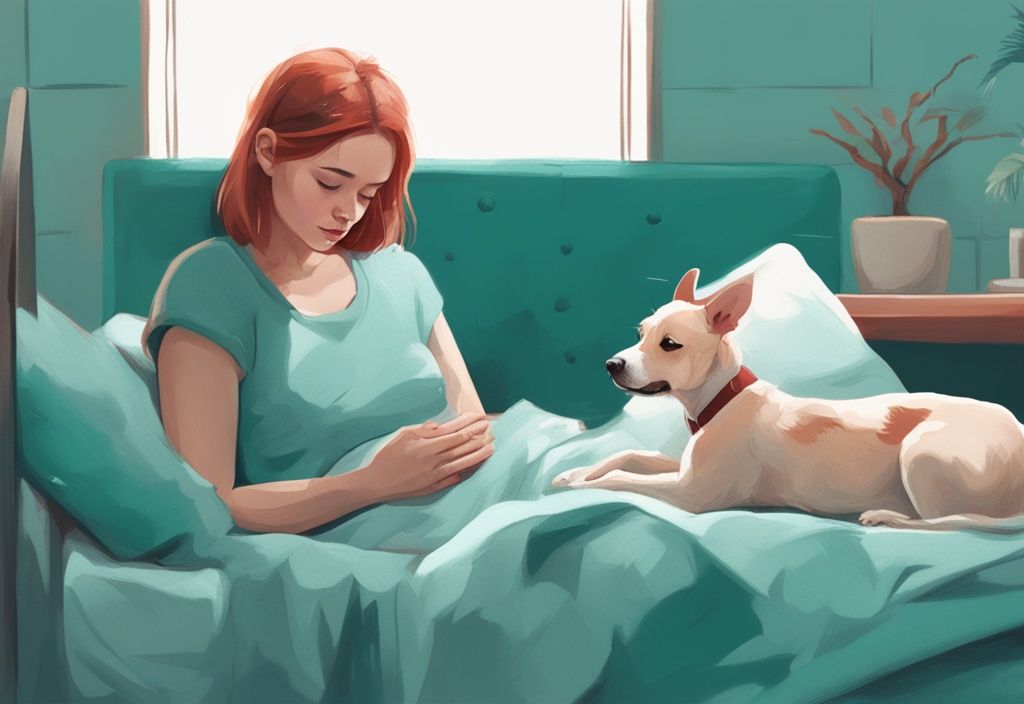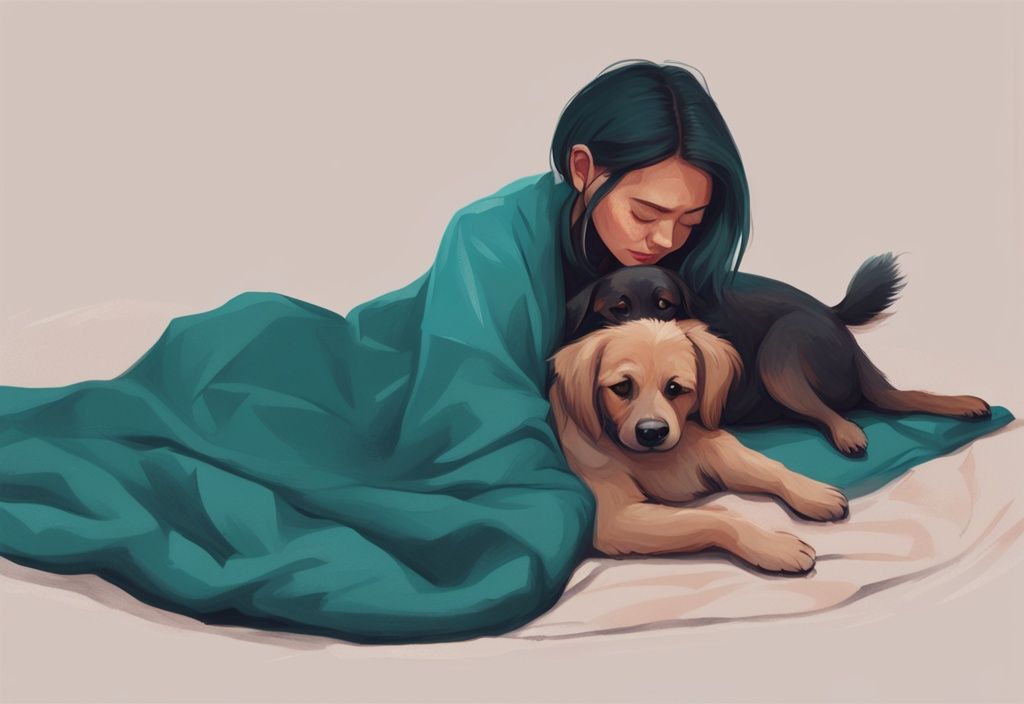Ever noticed your dog tremble like a leaf in a windstorm after getting home from surgery? I understand your worry. I have been there too. As a pet parent, it threw me for a loop when my dear Max started shaking after his operation. The concern is real, and I get that, hence this article.
A trembling pet post-surgery raises eyebrows and concern. It’s not the most pleasant sight, trust me. This guide peels back the layers on why your furry pal might be having the shakes. We’ll zero in on triggers like the after-effects of anesthesia, hypothermia, or possibly a result of stress, and how you can address them.
To top it off, we’re also touching on actionable ways to make your puppers’ post-operation recovery journey smooth sailing. You’ll not only understand why your doggy is acting different, but also how you can comfort and ensure they are on a sturdy path to recovery. After all, we want nothing but tail wags and healthy smiles post-surgery, right? Let’s unravel this together!
Why Is My Dog Shaking After Surgery?
Effects of Anesthesia and Pain Medication
During veterinary procedures, anesthesia is commonly used to render dogs unconscious and pain-free. This essential step for surgery can bring some post-operative surprises, like shaking. As the anesthesia or pain meds wear off, your dog might experience some temporary trembling; for more information on the effects of anesthesia, you can visit https://www.akc.org/expert-advice/health/what-to-know-about-anesthesia/. Think of it like waking up after a deep sleep from a really wild dream—your pup is just reorienting. With enough rest and a cozy spot to relax, your dog should stop shaking soon after the procedure. Knowing why your dog is shaking can ease your worries and ensure your furry friend’s speedy recovery.
Thermoregulation: Impact of Hypothermia
Hypothermia, a significant drop in body temperature, is a common challenge for about 40% of dogs undergoing anesthesia. Post-surgery, your dog goes through three stages: heat redistribution, a drop in body temperature, and finally, stabilization. This temperature rollercoaster can slow down recovery, increase bleeding risk, invite wound infections, and trigger the sympathetic nervous system, leading to shivers. While a few extra blankets might manage mild hypothermia, moderate to severe cases need professional veterinary attention. So, if Max—or your four-legged pal—feels a bit chilly, you’ll know just what to do!
The Role of Stress and Anxiety in Post-Operative Shaking
Surgery can be a stressful ordeal for our furry companions, often resulting in increased post-operative anxiety. This heightened state of stress can show up as shaking, especially in naturally anxious or high-strung dogs. Imagine if Whiskers, my cuddly cat, had to go through surgery—he would definitely need some extra snuggles! Showing extra love and creating a calm, comforting environment can help ease this anxiety. Picture a cozy den where your pet can feel safe and secure; this can significantly lower stress levels, making recovery more comfortable.
By paying attention to these factors—effects of anesthesia, the impact of hypothermia, and post-operative stress—you can better understand why your dog is shaking after surgery. Taking these steps ensures their comfort and paves the way for a quick and happy recovery.
Is Shaking Normal After Surgery?
Identifying Normal vs. Abnormal Shaking
Understanding why your dog might be shaking after surgery is crucial for ensuring their smooth recovery. Mild shaking is generally not a cause for alarm and often goes away without intervention. This type of shaking typically includes other minor symptoms like nausea, grogginess, and tiredness, which usually resolve within the first 24-48 hours post-surgery.
However, if you notice new shaking behavior that was not present immediately after the surgery, it may be a sign that something is not right. Persistent shaking that lasts longer than a day or two beyond the typical recovery period should prompt a visit to your vet. Other symptoms that sometimes accompany this condition, if they persist, can indicate complications. Veterinary advice is indispensable to ensure your pet’s health and well-being in such cases.
When to Seek Veterinary Help
Monitoring your dog closely after their surgery is essential. If you observe the shaking persisting or worsening over time, it’s a strong indicator that you need to contact your veterinary hospital. New shaking behaviors, especially those not evident immediately post-surgery, paired with unusual symptoms such as excessive vomiting, significant lethargy, or visible signs of discomfort, necessitate immediate veterinary consultation.

Complications that can lead to shaking include infections at the surgical site or adverse reactions to sutures. Identifying these issues early is critical to prevent them from developing into more severe health problems. A timely visit to the vet will allow for the quick treatment of any complications, ensuring that your furry friend returns to their happy, healthy self as soon as possible.
Managing Your Dog’s Post-Surgical Shaking
How to Create a Comfortable Recovery Environment
After surgery, your dog needs a serene and comfortable environment to recuperate effectively. Create a quiet space away from household hustle, reducing stimuli that could stress your pet. A cozy, warm bed will help your dog maintain body heat, especially important as hypothermia can cause shaking after surgery. Place soft blankets or use a heated pad under supervision to keep them warm. If your dog is small enough, hold them in your lap or sit beside them to provide soothing reassurance. Gentle petting and your calming presence can significantly diminish their anxiety and shaking, aiding in a smoother recovery.
Having a quiet and snug area is essential. Think of it as your dog’s little sanctuary! Keep it soft, warm, and filled with your tender loving care. Max, my Border Collie, always perks up when he snuggles next to me—your furry friend likely will too.
Ensuring Proper Nutrition and Hydration for Your Dog
Maintaining your dog’s energy levels and hydration is crucial post-surgery, especially if you’re wondering why is my dog shaking after surgery. Offer small, frequent meals to avoid overwhelming their digestive system while ensuring they receive necessary nutrients. Fresh water should always be accessible, as dehydration can exacerbate shaking. If you’re wondering, why is my cat being so affectionate could be a sign of their health needs changing. If your dog seems disinterested in food or water, try offering bland yet nutritious options like boiled chicken or rice, and consider using a pet-safe broth to entice drinking. Monitoring their food and water intake will help identify any concerning changes in their recovery.
Remember, it’s all about the little things. Small meals packed with nutrients can work wonders. Imagine offering a gourmet meal to a recovering friend—they’d appreciate it, and so will your dog! Max once turned his nose up at everything except boiled chicken and rice when he wasn’t feeling well. Whiskers eyed it jealously, of course!
Administering Prescribed Medications Properly
Adhering strictly to the medication schedule prescribed by your veterinarian is essential for addressing why is my dog shaking after surgery. These medications are intended to manage pain and reduce anxiety, two common factors contributing to post-surgical shaking. Read all instructions carefully and administer the correct dosage at the recommended times. Use reminders or set a schedule to ensure no doses are missed. If your dog resists taking medication, consider using pill pockets or mixing the medicine with a small treat. Consistent and proper medication administration can significantly ease discomfort and promote a steady recovery.
Think of those medications as little superheroes fighting off the villains causing discomfort. Giving pills isn’t always a battle you have to lose. Treats? Yes, please! Even Max, with his super nose, can’t resist the allure of a treat-filled pill pocket.
Recognizing Post-Surgical Complications in Dogs
Surgery isn’t fun for anyone, especially not for our four-legged friends. Let’s dive into what to watch out for post-surgery so that your furry companion recovers smoothly and stays healthy.
Spotting Infection or Other Serious Complications
Surgeries can sometimes uncover hidden health concerns or lead to pesky infections, especially without vigilant monitoring. It’s super important to keep the surgical site clean and follow all of the vet’s aftercare instructions to a T.
Think of an Elizabethan collar (those funny looking E-collars) as your dog’s new accessory. It’s a must-have to stop your pup from licking or scratching the surgery spot, which can introduce bacteria and cause an infection. Reducing your dog’s movements also helps to ensure the surgical site remains stress-free and healing occurs as it should.
Consistent monitoring is key. Keep an eye out for signs like redness, swelling, discharge, or any funky odors around the surgical area. If your dog is shaking persistently, it might be a sign of discomfort or a reaction to the surgery. A quick chat with your vet can help address these issues promptly.

What to Do If Shaking Persists or Worsens
If you find yourself asking, “why is my dog shaking after surgery,” and notice the shaking is sticking around or getting worse, it’s time to ring up the vet. Persistent shaking could point to deeper issues like an infection, pain, or even a reaction to the sutures.
Never ignore ongoing shaking; it’s your dog’s way of signaling something might be wrong. A vet’s assessment is crucial to diagnose and treat any complications that might be lurking. Stick to the follow-up care instructions from your vet to dodge any potential risks and help your dog get back to their usual tail-wagging self in no time.
Main Takeaways
If you’re wondering, why is my dog shaking after surgery, understanding the primary reasons can help ease your concerns. Below are the main takeaways you should keep in mind:
Shaking After Surgery is Mostly Temporary
One of the most frequent questions pet owners ask is why is my dog shaking after surgery. This shaking is often a temporary side effect of the anesthesia or medication used during the procedure. General anesthesia, specifically, can leave your pet feeling unsteady and shaky as it wears off. Similarly, pain medications can also contribute to these tremors.
The good news is that this type of shaking typically resolves itself. Your dog should return to normal once the medication fully exits their system.
Maintaining a Warm, Calm, and Comfortable Environment
Another essential aspect of understanding why is my dog shaking after surgery centers around their post-operative environment. Keeping your dog warm and comfortable can significantly reduce shaking and ease their recovery. Use blankets and a quiet space to create a peaceful resting area for your dog.
This helps in thermoregulation, especially if hypothermia is a concern due to the drop in body temperature often seen post-anesthesia.
When Shaking Persists or Worsens: Seek Veterinary Assistance
While mild shaking is usually not alarming, persistent or worsening shaking should be addressed by a veterinarian. Monitoring is crucial, especially if shaking continues beyond the expected recovery period or is coupled with other symptoms like lethargy, vomiting, or pain.

Immediate consultation with your vet can help identify any potential complications or secondary issues.
Importance of Following Post-Operative Care Instructions
Finally, adhering carefully to all post-operative care instructions provided by your vet can make a significant difference. Properly administering prescribed medications is critical in managing pain, reducing anxiety, and preventing further complications.
Following these guidelines helps to answer the persistent question of why is my dog shaking after surgery and paves the way for a smoother recovery process.
By keeping these key points in mind, you can better support your dog through their post-surgical recovery and ensure a comfortable and swift return to normalcy.
Frequently Asked Questions About Dogs Shaking After Surgery
Why is my dog still shaking 24 hours after surgery?
Shaking 24 hours post-surgery could indeed be due to lingering effects of anesthesia or pain medication. Picture it like your pup’s body trying to wake up fully from a snooze. If the shaking persists beyond the 24-hour mark or if you notice any other funky symptoms popping up, it’s definitely vet time! Better safe than sorry, right?
Does post-operative shaking indicate pain in dogs?
Oh, you bet! Pain can absolutely cause your fur baby to shake, even if you’re on top of their pain management game. Think of it as their way of saying, “Ouch, this still hurts!” Double-check that they’re getting the right dosage of pain meds. If the shaking isn’t easing off, a chat with your veterinarian will ensure your little pal is as comfortable as can be.
Is it usual for older dogs to shake more following surgery?
Yes, older dogs often have a tougher time bouncing back after surgery. Especially if they’re carrying a bit of extra weight or dealing with other health issues. It’s kind of like how we humans might feel more achy and stiff after a workout as we age. The type and length of the surgery, their age and general health can all affect their recovery and shaking levels. Extra TLC might be just what the doctor ordered.
How to calm my dog during the recovery period?
First things first, create a warm, cozy recovery haven for your dog. Think fluffy blankets and a quiet space. Spend some extra snuggle time with them—your presence can be super soothing. Follow all the post-op instructions like a pro and make sure they get their meds on time. A calm environment and lot of love can work wonders!
